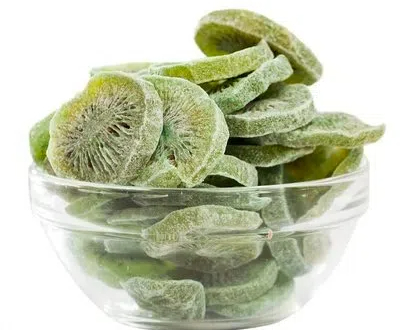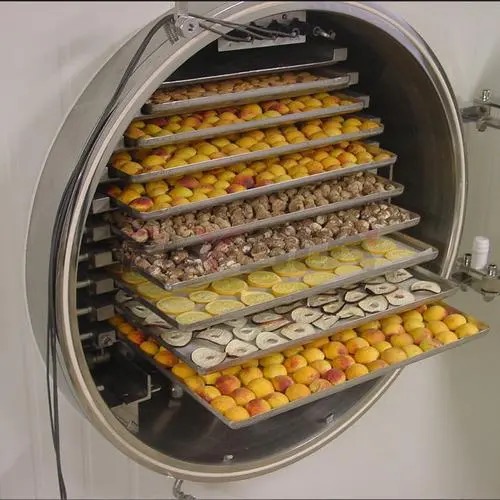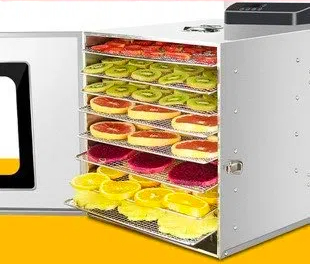
Content Menu
● Understanding Heat Pump Dryers
● Energy Efficiency and Cost Savings
● Environmental Impact
● Improved Product Quality
● Versatility in Food Processing
● Simplified Operation and Maintenance
● Financial Incentives and Rebates
● Case Studies of Successful Implementation
● Future Trends in Food Drying Technology
● Conclusion
● Frequently Asked Questions
>> 1. What types of food can be dried using heat pump dryers?
>> 2. How much energy can I save by using a heat pump dryer?
>> 3. Are there specific requirements to qualify for California's heat pump dryer rebates?
>> 4. What is the lifespan of a heat pump dryer?
>> 5. Can heat pump dryers be integrated into existing production lines?
In recent years, the demand for energy-efficient appliances has surged, particularly in the food processing industry. One such appliance that has gained significant attention is the heat pump dryer. This technology not only conserves energy but also enhances the quality of dried food products. In California, various rebate programs are available to encourage the adoption of heat pump dryers, making them an attractive option for food manufacturers. This article explores the benefits of heat pump dryer rebates in California, particularly for food drying applications, and provides insights into how these systems can revolutionize food processing.

Understanding Heat Pump Dryers
Heat pump dryers operate on a simple yet effective principle: they use a refrigeration cycle to extract moisture from food products. Unlike traditional dryers that rely on high temperatures, heat pump dryers operate at lower temperatures, which helps preserve the nutritional value and flavor of the food. This technology is particularly beneficial for drying fruits, vegetables, and herbs, as it minimizes the risk of nutrient loss and maintains the integrity of the product.
Energy Efficiency and Cost Savings
One of the primary benefits of heat pump dryers is their energy efficiency. These systems consume significantly less energy compared to conventional drying methods. In California, where energy costs can be high, this translates into substantial savings for food manufacturers. By utilizing heat pump dryers, businesses can reduce their energy consumption by up to 50%, leading to lower operational costs.
Moreover, the California government offers rebates for businesses that invest in energy-efficient technologies. These rebates can offset the initial investment costs of heat pump dryers, making them more accessible for food manufacturers. By taking advantage of these rebates, companies can achieve a quicker return on investment while contributing to environmental sustainability.
Environmental Impact
The food processing industry is a significant contributor to greenhouse gas emissions. By adopting heat pump dryers, manufacturers can reduce their carbon footprint. These dryers use less energy, which means fewer fossil fuels are burned to generate electricity. Additionally, heat pump dryers often have a longer lifespan than traditional dryers, reducing waste and the need for frequent replacements.
California's commitment to sustainability is reflected in its various programs aimed at reducing energy consumption and promoting renewable energy sources. By participating in these initiatives, food manufacturers can align their operations with the state's environmental goals.
Improved Product Quality
Heat pump dryers excel in maintaining the quality of dried food products. The lower drying temperatures help preserve the color, flavor, and nutritional content of the food. This is particularly important for businesses that prioritize high-quality products, as consumers are increasingly seeking healthier and more nutritious options.
For example, when drying fruits, traditional methods can lead to browning and loss of flavor. In contrast, heat pump dryers maintain the vibrant colors and natural sweetness of the fruit, resulting in a superior product that appeals to health-conscious consumers. This quality retention can also enhance the marketability of products, allowing manufacturers to command higher prices.
Versatility in Food Processing
Heat pump dryers are versatile and can be used for a wide range of food products. From fruits and vegetables to herbs and meats, these dryers can accommodate various drying needs. This flexibility makes them an ideal choice for food manufacturers looking to diversify their product offerings.
Additionally, heat pump dryers can be integrated into existing production lines, allowing businesses to enhance their operations without significant disruptions. This adaptability is crucial for manufacturers aiming to stay competitive in a rapidly evolving market. For instance, a company that primarily dries fruits can easily expand into drying vegetables or herbs without needing to invest in entirely new equipment.
Simplified Operation and Maintenance
Modern heat pump dryers are designed with user-friendly interfaces, making them easy to operate. Many models come equipped with advanced controls that allow users to set specific drying parameters, ensuring optimal results for different food products. This ease of use can lead to increased productivity and reduced labor costs.
Maintenance of heat pump dryers is also straightforward. Regular cleaning and occasional servicing are typically all that is required to keep these systems running efficiently. This low maintenance requirement further enhances their appeal for food manufacturers. Additionally, many manufacturers offer training and support to ensure that operators can maximize the efficiency of their equipment.

Financial Incentives and Rebates
California's rebate programs for heat pump dryers are designed to encourage businesses to invest in energy-efficient technologies. These rebates can significantly reduce the upfront costs associated with purchasing and installing heat pump dryers.
To qualify for these rebates, businesses must meet specific criteria, such as purchasing ENERGY STAR-rated equipment and demonstrating energy savings. The application process is generally straightforward, and many manufacturers find that the financial incentives make the transition to heat pump dryers more feasible.
Case Studies of Successful Implementation
Several food manufacturers in California have successfully implemented heat pump dryers and reaped the benefits. For instance, a local fruit processing company reported a 40% reduction in energy costs after switching to a heat pump dryer. They also noted an improvement in the quality of their dried fruits, which led to increased customer satisfaction and repeat business.
Another case involved a vegetable processing plant that integrated heat pump dryers into their production line. The plant manager highlighted the versatility of the equipment, stating that they could now dry a wider variety of vegetables without compromising quality. This flexibility allowed them to expand their product range and attract new customers.
Future Trends in Food Drying Technology
As technology continues to advance, the food drying industry is likely to see further innovations. Heat pump dryers are expected to become even more efficient, with improvements in energy consumption and drying times. Additionally, the integration of smart technology will allow for better monitoring and control of the drying process, ensuring optimal results.
Moreover, as consumer demand for sustainable and high-quality food products grows, manufacturers will increasingly turn to energy-efficient solutions like heat pump dryers. This trend will not only benefit businesses but also contribute to a more sustainable food processing industry.
Conclusion
The benefits of heat pump dryer rebates in California are numerous, particularly for food manufacturers. From energy savings and environmental impact to improved product quality and operational efficiency, heat pump dryers represent a smart investment for businesses in the food processing industry. By taking advantage of available rebates, manufacturers can enhance their sustainability efforts while enjoying significant cost savings.
As the demand for energy-efficient solutions continues to grow, heat pump dryers will play an increasingly important role in the food processing sector. By adopting this technology, businesses can not only improve their bottom line but also contribute to a more sustainable future.

Frequently Asked Questions
1. What types of food can be dried using heat pump dryers?
Heat pump dryers can be used to dry a variety of food products, including fruits, vegetables, herbs, and meats.
2. How much energy can I save by using a heat pump dryer?
Businesses can save up to 50% on energy costs compared to traditional drying methods.
3. Are there specific requirements to qualify for California's heat pump dryer rebates?
Yes, businesses must purchase ENERGY STAR-rated equipment and demonstrate energy savings to qualify for rebates.
4. What is the lifespan of a heat pump dryer?
Heat pump dryers typically have a longer lifespan than traditional dryers, often lasting 10-15 years with proper maintenance.
5. Can heat pump dryers be integrated into existing production lines?
Yes, heat pump dryers are versatile and can be easily integrated into existing food processing operations.












